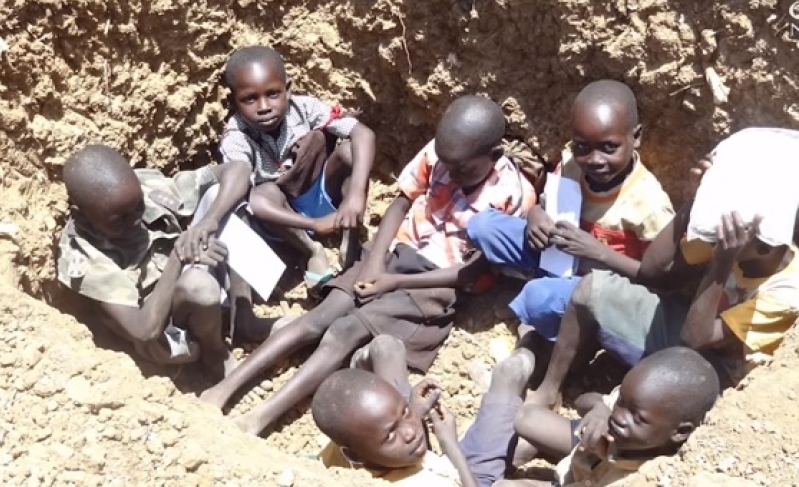
A Sudanese Air Force bombing of civilians in the Nuba Mountains town of Heiban on Monday (May 23) struck a Christian family, killing a 6-month-old boy and wounding six others, a rebel source said.
One of several bombs dropped from a Russian-made Antonov plane on the town in South Kordofan state killed infant Kacho John and wounded 4-year-old Kuku John, 7-year-old Zainab John and Kaka John, 20, of the Sudanese Church of Christ. Others injured were identified as Hafida Abdurahman Banat, 10, Hani Saeed Kori, 35, and Ismail Alnur.
A spokesman for the rebel Sudan People's Liberation Army-North (SPLA-N), which is battling government forces in southeastern Sudan, noted the bombing in a press statement on Facebook. There was no independent confirmation of the bombing as of this writing. The area's predominantly black ethnic Nuba believe that since South Sudan split from Sudan in a 2011 referendum, the government's goal of quashing SPLA-N rebels is also meant to rid the area of non-Arabs and Christianity.
Since April 2012, Sudan has dropped 4,082 bombs on civilian targets, according to Nuba Reports. This week's killing follows bombing of Heiban on May 1 in which six children ages 4 to 13 were killed, including four from a Muslim family.
Church leaders said a government jet fighter dropped four parachute bombs at about 6 p.m., and one struck next to a foxhole where the children had taken cover. There are no military installations in the area.
"One of the bombs exploded at my house, and I knew my kids and other children were dead," Al-Sheikh Abdelrahman Ibrahim Al-Toum told area journalists.
The other two children killed belonged to Yacoub Omar and his wife, Hanan Ismail, who was also wounded and received hospital treatment, according to Nuba Reports.
The attack triggered protests within Sudan as hundreds of people signed a petition calling for a halt to government bombing of civilians, Nuba Reports stated. The petition includes 620 signatories from 29 opposition parties, 31 civil society organizations and 560 individuals that "call for the re-awakening of the Sudanese national consciousness to take campaign actions in response to this crime ... and make Heiban the last aerial bombardment against civilians," according to Nuba Reports.
On April 17 a government Antonov plane dropped six bombs on the Nyukur area of Delami County, wounding three civilians, according to SPLA-N spokesperson Arnu Ngutulu Lodi. Civilians in Umserdiba were killed in shelling on March 24, killing 34-year-old Hawa Sabit, a member of the Sudanese Church of Christ and a mother of four, according to Lodi. An unrelated child, 7-year-old Mubarak Tutu, was reportedly wounded during the same attack but died en route to a hospital.
On April 3 Najala Omer, a Christian civilian, was killed when four bombs struck Hakima Medical Training School, according to an area journalist. Six others were wounded.
The Nuba people have longstanding complaints against Khartoum - including neglect, oppression and forced conversions to Islam in a 1990s jihad - but as Sudanese citizens on the northern side of the border, they were never given the option of secession in the 2005 peace pact between northern and southern Sudan.
The rebels in the Nuba Mountains were formerly involved with the southern Sudan People's Liberation Army (SPLA) forces fighting Khartoum before the 2005 Comprehensive Peace Agreement (CPA). Fighting between Sudan and South Sudan broke out in June 2011, when Khartoum forcefully attempted to disarm the SPLA-N in South Kordofan by force rather than awaiting a process of disarmament as called for in the CPA. When the CPA was signed in 2005, the people of South Kordofan were to vote on whether to join the north or the south, but the state governor suspended the process.
Ethnic Nuba, along with Christians, face discrimination in Sudan, where President Omar al-Bashir has vowed to adopt a stricter version of sharia (Islamic law) and recognize only Islamic culture and the Arabic language.
Due to its treatment of Christians and other human rights violations, Sudan has been designated a Country of Particular Concern by the U.S. State Department since 1999, and the U.S. Commission on International Religious Freedom recommended the country remain on the list in its 2016 report.
Sudan ranked eighth on Christian support organization Open Doors' 2016 World Watch List of countries where Christians face most persecution.







